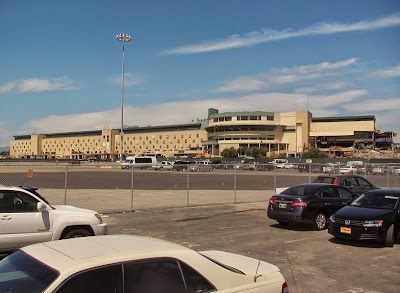In the same complex is Hollywood Park, a horse racing track that's been around for 75 years. Personally, I had never heard of it, but Ron insists it's very famous. It's quite a place.
But wait! What's going on?
Anyway, our purpose in coming to this area was to visit something Ron and I had both wanted to see, La Brea Tar Pits. Imagine these giant mammoths wading into a pond of tar and being sucked under.
Just look at the tar bubbling up.
We signed up for the guided tour and found out we had a lot of misconceptions about the tar pits. First of all, it's not tar, but asphalt that seeps up through cracks in the earth's crust and forms shallow pools. And those bubbles are methane gas.
Our guide was very knowledgeable and answered all questions. She took us into an observation area where we could view fossils in situ.
They have cataloged 5.5 million fossils so far and work is continuing. When an underground parking garage was built nearby, the displaced earth was boxed up for future exploration.
I was fascinated with how they simply fenced off areas where the asphalt is present. She explained that the asphalt is super sticky and the animals who wandered in couldn't get loose. During their struggles they probably fell over and became even more trapped. So, sorry to say, they simply starved to death or perhaps were killed by carnivores who then also became stuck.
I wasn't worried until she talked about the '6th Street Fault' and I realized that we parked on 6th Street!
We also found the Page Museum so interesting.
The fossils recovered are from the end of the last ice age, long after the dinosaurs went extinct. A lot of these animals reminded me of really large versions of current day species. Like this giant sloth.
Or the saber-toothed cat attacking the giant sloth.
But let's face it, it's all about the bones. This is Merriam's giant condor.
And the Columbian mammoth. Don't let the name fool you, all the fossils on display were found in La Brea tar pits.
But because of movement in the pits, the skeletons were not found intact. Our guide said there could be as many animals contributing to the skeleton as there are bones.
Some of the animals were very similar to, or even identical to ones still around. I liked how they did this exhibit with the skeletons placed in front of drawings of the animals.
Both Ron and I were thrilled with our day. Luckily I had read the reviews on Trip Advisor and bought the tour tickets online. It seems those tours fill up and it wouldn't have been nearly as wonderful without taking the tour. It was a bargain at the senior price of $9 for the museum/tour ticket.













I had no idea they did tours. Of course, we visited in the 1980's and they may not have been offered, or we simply didn't realize it. Looks like the Page Museum is a fascinating place to explore.
ReplyDeleteMakes you wonder how they were able to get the skeletons out of the tar without getting stuck in themselves. :cO
ReplyDeleteCool that it has preserved all that natural history for generations to come!! Ive heard of Hollywood Park due to my racing background...I have done a 180 on my opinion of horse racing and it would suit me fine if they tore all of them down...Just saying..lol
ReplyDeleteAll those huge skeletons puts us humans into perspective....just think how much has gone on before?
ReplyDeleteI never would have ever thought of going there--at least until I read your post. And I will look online for advice when we are planning to go on a tour somewhere.
ReplyDeleteLooks like my kind of tour! I'm hoping to get out to California with my mom late winter, so many museums out that way.
ReplyDelete